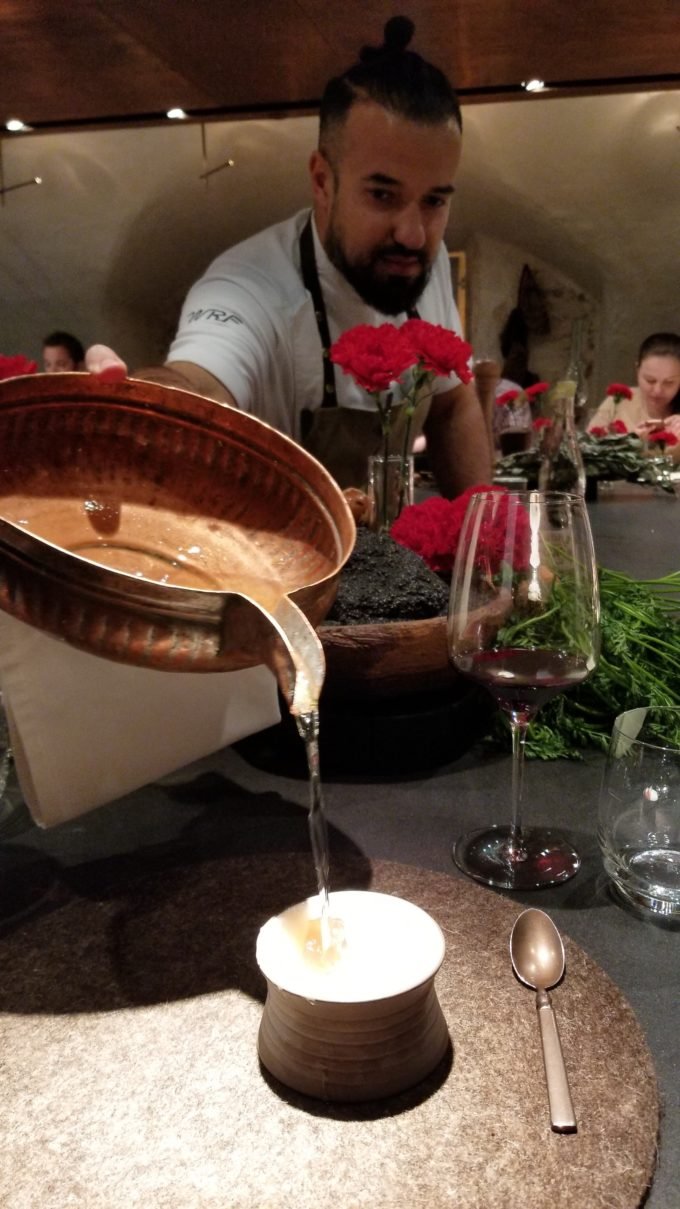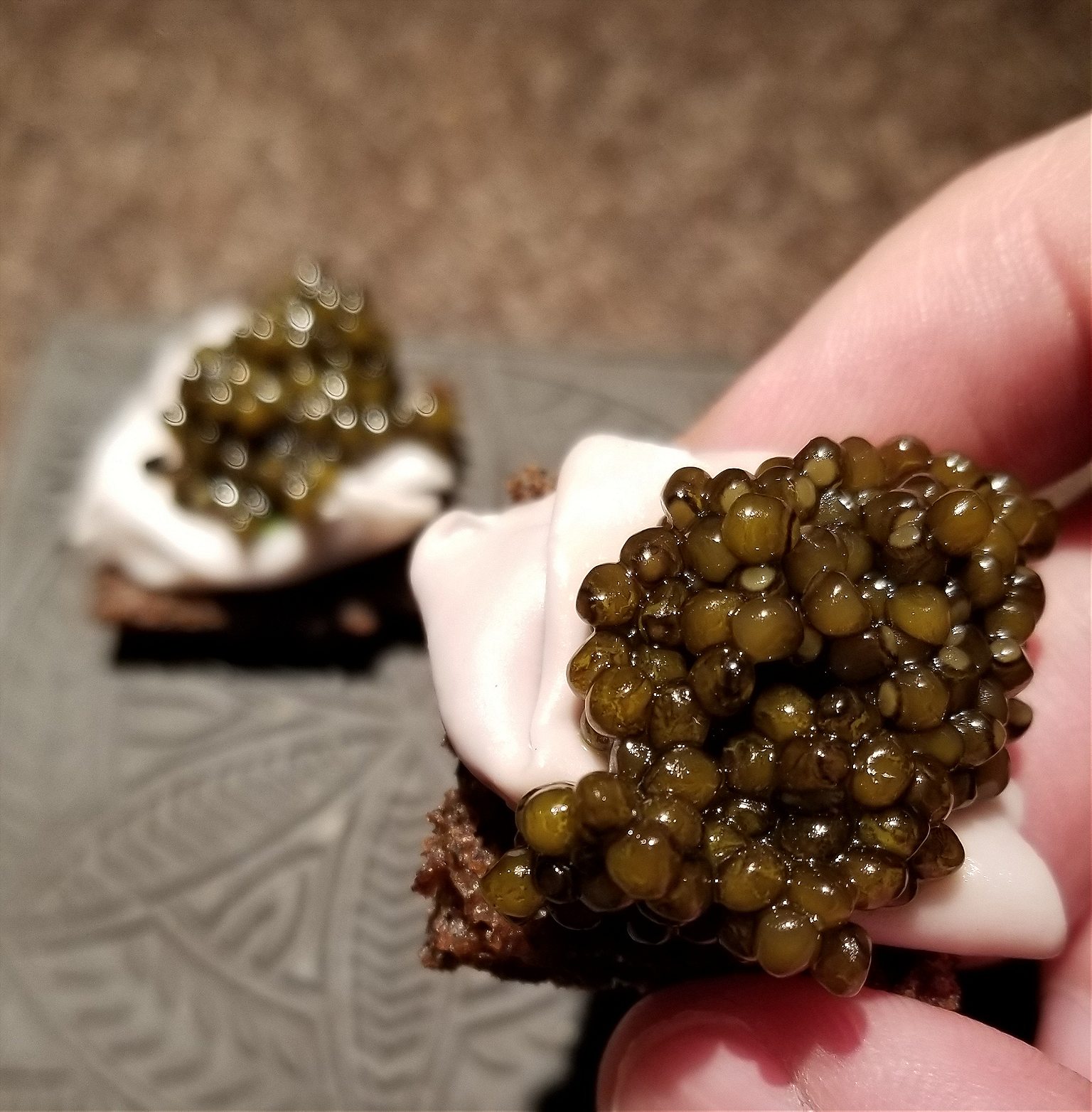
Reviving classic Russian cuisine

Roads & Kingdoms talks to Russian chef Vladimir Mukhin of Moscow’s super-restaurant, White Rabbit.
Still in his mid-30’s, Vladimir Mukhin is already one of Russia’s best known chefs and the leading culinary light of the White Rabbit Group, which has 16 restaurants around the country. The most well-known of these, Moscow’s White Rabbit, was named one of the 50 best restaurants in the world last year. Roads & Kingdoms’ Nathan Thornburgh talked to Mukhin in Moscow about being a fifth-generation chef, reviving classic Russian cuisine, and finding good product in the age of embargoes.
Nathan Thornburgh: Tell me about White Rabbit, what is the food? What are you trying to accomplish there?
Vladimir Mukhin: The White Rabbit is a big restaurant. We’re trying to revive Russian cuisine. I’m a fifth-generation chef, so I’m passionate about the food we create. During the Soviet Union period, we killed Russian food. Classic Russian recipes became too simplified. For example, usually you drink tea, but if you want to be, just to be creative, want to make the tea with milk, you can’t. It would be like stealing milk from the government. People went to jail.
When I was growing up, I remember my grandfather coming to the kitchen and crying because he couldn’t experiment with his food.
Thornburgh: Wow. I remember this famous photo session with Che Guevara which came up with some of his best pictures, maybe two incredible iconic portraits came from an entire roll of film, and the photographer went to him and showed him this roll of film and Che said, What the hell are you doing? You wasted all of these images. You took 30 pictures to get one? That’s the government’s film. It’s a similar mentality. So you’re telling the story of a kind of cuisine that was lost on the Soviet history and now you’re playing with this idea of finding it again. What does your process look like? Do you get as many grandmothers as you can round up and just kind of shake recipes out of them? How were you doing this?
Mukhin: I just try to work with as many local farmers and producers as I can, so we can use as many Russian ingredients as we can.
Thornburgh: So this is a close relationship.
Mukhin: Yes. I traveled throughout Russia—not just the big cities, but also the villages to talk with older people.
Thornburgh: You know I think people don’t understand the vastness of Russia, and how big it’s collection of cultures and languages and cuisines is. What parts of the country influences your food?
Mukhin: I’m inspired by the whole country. It’s a big territory, and sometimes it feels like it’s too big. I try and use different techniques and ingredients from all over the country, which I think makes my menus distinct.
We have an a la carte menu with about 50 dishes of classical Russian food. Everything looks modern because I’m a young chef. But if you close your eyes and try these dishes, you’ll taste 100% classic Russian flavors.
I want to highlight all aspects of Russian cuisine. Before the Olympic Games in Sochi, we opened a restaurant there, not just to make money, but to expose people visiting for the Olympics to Russian food. That’s why we opened The Red Fox restaurant. It’s all about Russian ingredients.
Thornburgh: Sochi, at least when I’ve been there, is like a Miami Beach. It’s like a place to get pizza and sushi, and go to the nightclubs.
Mukhin: You been?
Thornburgh: Yeah.
Mukhin: It’s crazy.
Thornburgh: It’s a little crazy, but it’s interesting to bring in Red Fox and sort of say okay, because people are coming out, let’s bring Russia to Sochi.
Mukhin: It was incredible. We had thousands of visitors at the restaurant.
Thornburgh: So you really looked internally for inspiration. Did working outside of Russia motivate you to focus on Russian cuisine?
Mukhin: Yes. I spent time working in Avignon, France. I worked with Christian Etienne, and he would make a special Russian meal once a year. It was crazy.

Thornburgh: How was the food?
Mukhin: It was shit. I told him that I would cook real Russian food for him, and I did. I cooked borscht, blinis, and other classics. He liked it and said that once a year we should use my recipes, but with his influence. I agreed, and we went on to make amazing food. Eventually, I wanted to come back to my motherland. So I left and I started working on making White Rabbit a reality.
Thornburgh: When people go to White Rabbit, what are they going to find?
Mukhin: Someone once told me that there is a new Russian cuisine and an old Russian cuisine. I think Russian cuisine is going through an evolution. So I hope people will come and see evolution at White Rabbit.
Thornburgh: Great. Always good to end on an invite. Thank you.
Mukhin: Thank you so much.
Up Next
21 Things to Know Before You Go to Moscow
Moscow City Guide
A History of Moscow in 13 Dishes
War, hunger, and some of the world’s great doomed social experiments all changed the way that Moscow eats.
A Meeting in Exile
In an excerpt from Masha Gessen’s acclaimed new book The Brothers, the story of how the Boston marathon bombers’ parents met.
Can We Also Get Drunk With This Badass Centenarian Female USSR Combat Aviator Pls?
THIS is a drinking story.
An Apple a Day Keeps Putin Away
Ola Cichowlas returns to the Polish orchards her grandmother grew up in to find out how apple growers are handling Russia’s boycott of this year’s harvest.






